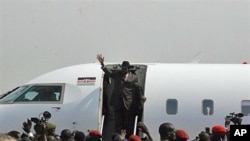As south Sudan prepares for nationhood in a few months, leaders in government, civil society and the donor community are struggling with the many needs of what is soon to be Africa’s newest state. They agree that the challenges are enormous, but differ over the most important priority when asked the question during a recent visit to Juba.
A series of interviews with leaders involved in southern Sudan’s reconstruction showed considerable knowledge of the challenges ahead for the fledgling nation, but differences of opinion over the number one priority.
Many priorities
Sarah Johnson, an official with the Carter Center, which engages in democracy building, election monitoring and other activities, said the priorities are many.
"The basics [are] of making sure that it’s a stable, peaceful state and focusing on the basic building blocks of education and health services, and really expanding the basic government services out into the regions," said Johnson.
The head of Juba University, Aggrey Abate, said developing agriculture will be vital for a country where only four percent of the arable land is under cultivation and millions of people need food aid to survive.
He said his university can play a major role in this effort.
"Agriculture is a very important area," said Abate. "And we, as an institution, will have the role of producing those [graduates] who will come out and work in the agricultural sector, in terms of the necessary interventions that need to be made to improve our food security."
Training, education
William Deng heads the De-Mobilization Commission that is overseeing the return of 90,000 former fighters to civilian life. He said training and education will be vital to the de-militarization of society.
"Most of the soldiers that have come out [of the army] are not educated. They don’t have skills. The skill they only know is soldiering. Now, you must train them with life skills, such as carpentry, making bricks and also small agriculture, or micro-financing," said Deng.
Infrastructure
An economist with the Frederich Ebert Stiftung Foundation in Juba, Mou Ambrose Thiik, said a major priority is to build up the new nation’s infrastructure.
South Sudan, roughly the size of France, has only 50 kilometers of paved roads and almost no public electrical power. It also lacks public water and sanitation systems.
Thiik said the new nation has the mineral resources and international support to build these structures but the process must be well-managed.
"The major priority is to set the governance right. It’s very important because that will set up a very good foundation for the democratic system we would like to have in southern Sudan," said Thiik.
He noted that the lack of skilled public servants slows the delivery of government services, especially at the local level. He said capacity building is needed through training programs and the recruitment of skilled southern Sudanese living abroad.
Transparency
International donors said they are eager to aid the construction of Africa’s newest nation. But the U.S. Consul-General in Juba, Barrie Walkley, said donors, like the southern Sudanese people, want to see results.
"The government needs to concentrate on the transparency issue, to be honest with the people, to tell the people how much money is available, where the resources are and how that money is being spent."
The head of the United Nations Mission in southern Sudan, David Gressley, said the government must make great efforts to address the high expectations of a people experiencing freedom following decades of marginalization.
"The government will have to be very honest about what they can and cannot do. They will have to also demonstrate visibly that they’re dealing with internal issues of mismanagement, corruption, etc. They need to be able to show that they are tackling those problems, so that people believe that if they’re not getting something today in terms of services, that they will in the near future," said Gressley.
Gressley noted that parts of south Sudan continue to experience security threats, which he blames primarily on traditional conflicts and the lack of administrative structures to deal with them.
He said these eventually will be resolved, though, as long as they are not used by political leaders to advance personal agendas.




